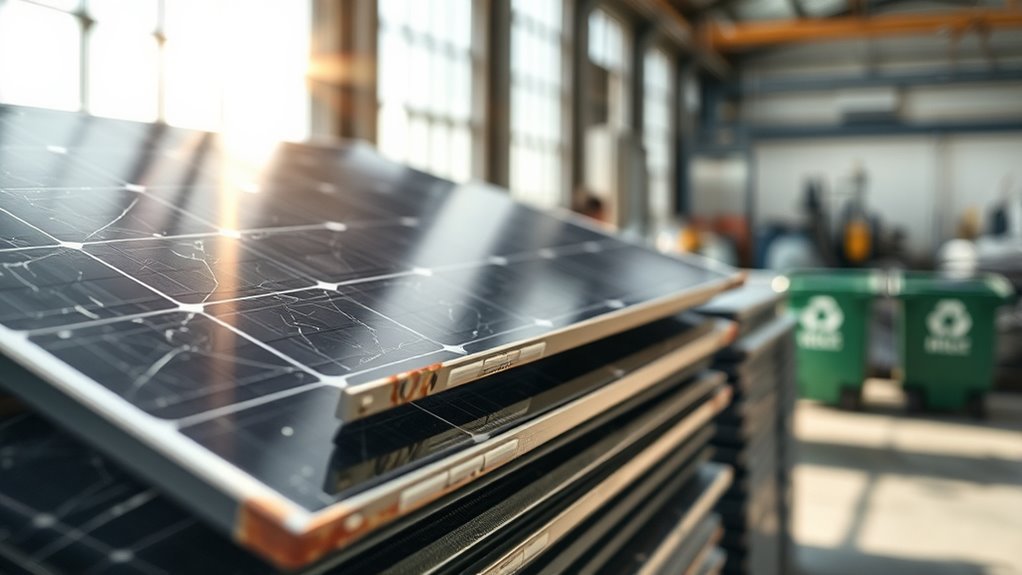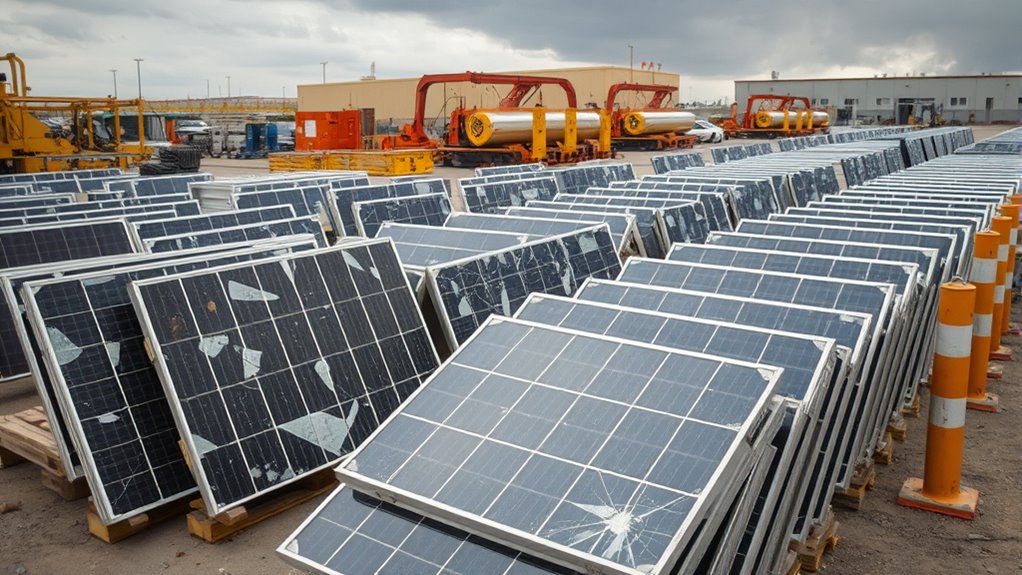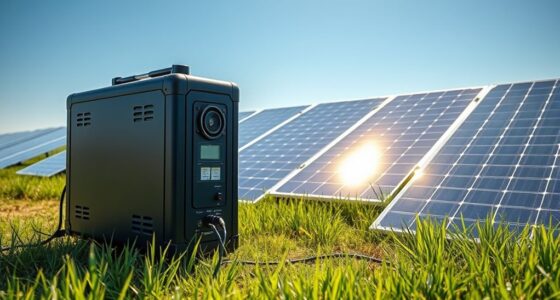When your solar panels wear out, it’s important to recycle them responsibly to recover valuable materials like silicon, aluminum, and silver while preventing environmental harm. Avoid throwing them in the trash, as hazardous substances could leach into soil and water. Instead, find a certified recycling facility that handles solar panels or check if local programs accept them. Proper disposal minimizes waste and supports sustainability—continue exploring to discover how you can guarantee correct recycling and environmental protection.
Key Takeaways
- Contact certified recycling facilities to ensure proper disposal of worn-out panels.
- Disassemble panels if possible, separating recyclable materials like glass, silicon, and metals.
- Avoid dumping panels in regular trash to prevent environmental contamination from hazardous substances.
- Support policies and programs that promote solar panel recycling and responsible disposal.
- Educate yourself on local recycling options and advocate for improved solar waste management infrastructure.

Have you ever wondered what happens to solar panels once they reach the end of their lifespan? As solar technology becomes more widespread, understanding how to responsibly handle aging or damaged panels is essential. When solar panels wear out or become damaged, they can pose environmental challenges if discarded improperly. The key to minimizing their environmental impact lies in effective recycling technologies that recover valuable materials and prevent harmful waste from polluting landfills or water sources.
Recycling technologies for solar panels have advanced considerably, making it possible to extract useful components such as silicon, glass, and metals like aluminum, copper, and silver. These processes typically involve disassembling the panels, then breaking down the components to recover raw materials. This not only reduces the demand for virgin resources but also cuts down the energy consumption involved in manufacturing new panels. By recycling, you help conserve natural resources and lessen the environmental impact associated with mining and processing raw materials.
Recycling solar panels recovers materials, reduces resource demand, and lowers energy use in manufacturing.
When panels are sent for recycling, specialized facilities use cutting-edge technology to safely separate and process the different materials. For example, some methods involve thermal processes that remove the plastic backing and other non-recyclable parts, leaving behind the silicon and glass. Chemical treatments can then further purify these materials, making them suitable for manufacturing new panels or other products. These recycling processes are designed to be efficient and environmentally friendly, preventing hazardous waste from leaching into the environment. Additionally, advances in high-efficiency recycling methods are improving the recovery rates and reducing costs, making responsible disposal increasingly accessible.
However, not all recycling options are equally accessible or effective everywhere. It’s important to know whether your local recycling centers have the capacity to handle solar panels properly. In some regions, specialized facilities are still emerging, which can make it challenging to dispose of panels responsibly. As a solar user, you can advocate for better infrastructure and support policies that promote recycling programs. Proper disposal and recycling help ensure that toxic substances like lead and cadmium, sometimes present in older panels, don’t contaminate soil or water.
Frequently Asked Questions
How Long Do Solar Panels Typically Last Before Needing Recycling?
Your panel lifespan generally ranges from 25 to 30 years, depending on durability factors like quality, climate, and maintenance. As panels age, their efficiency declines, and eventually, they need replacement. When this happens, recycling becomes essential to recover valuable materials and reduce waste. By understanding durability factors, you can better plan for eventual disposal and guarantee the recycling process is handled responsibly.
Are There Any Health Risks Involved in Solar Panel Recycling?
Recycling solar panels isn’t a danger of nuclear catastrophe, but chemical hazards do exist if you’re not careful. You need to prioritize worker safety because exposure to toxic materials like lead and cadmium can cause serious health issues. Proper handling, protective gear, and safe disposal methods are essential. If you follow best practices, you minimize risks and help protect both your health and the environment.
What Are the Costs Associated With Recycling Old Solar Panels?
When considering recycling old solar panels, you should look into cost estimation and recycling fees. These fees can vary based on the panel size, material, and recycling facility. Typically, you’ll pay a fee to cover the recycling process, which might range from a few dollars to several hundred. It’s wise to get quotes from local recyclers to understand the total costs involved and guarantee environmentally responsible disposal.
Can Recycled Solar Panels Be Reused or Repurposed?
Did you know that around 80% of solar panel materials can be recycled? Recycled solar panels can often be reused or repurposed, making them a sustainable choice. You can explore panel reuse for new installations or find alternative uses like building materials, outdoor furniture, or art projects. By repurposing panels, you extend their life and reduce waste, helping you contribute to environmental conservation while maximizing your investment.
How Do Recycling Processes Differ for Residential Versus Commercial Panels?
When recycling residential versus commercial panels, you’ll find the processes differ mainly in scale and complexity. You perform material separation diligently to recover valuable components. For commercial panels, which are larger, the process often involves more hazardous waste handling due to greater material volume. You need specialized facilities and safety protocols to guarantee hazardous waste isn’t released, making commercial panel recycling more intricate than residential panel recycling.
Conclusion
When your solar panels reach the end of their life, don’t let them become a ticking time bomb for the environment. Recycling isn’t just an option — it’s your responsibility to guarantee they’re properly disposed of, preserving valuable materials and reducing waste. Think of it as passing the torch: you’re safeguarding the planet’s future with every responsible step you take. So, when it’s time, choose recycling — because a brighter, cleaner tomorrow depends on it.









